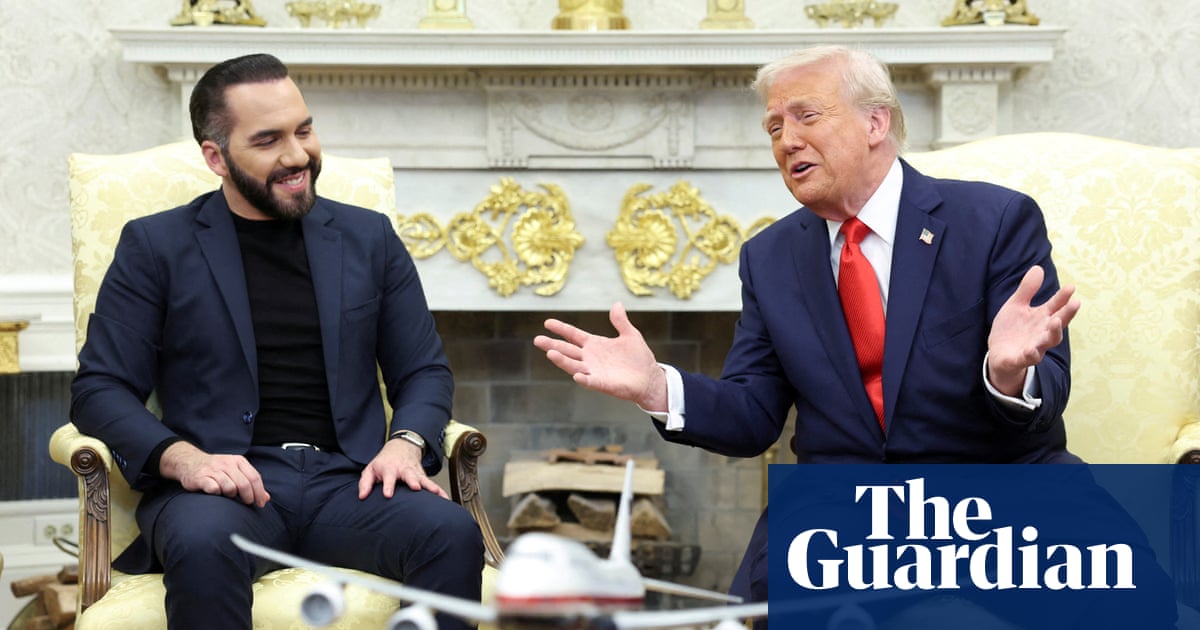TheTrump administrationhas been in touch directly with the Salvadorian president Nayib Bukele in recent days about the detention of Kilmar Ábrego García, the man wrongly deported to a notorious prison in El Salvador, according to two people familiar with the matter.
The nature of the discussion and its purpose was not clear because multiple Trump officials have said the administration wasnot interested in his coming backto the US despite the US supreme court ordering it to “facilitate” Ábrego García’s release.
The contacts produced no new developments after Bukele rejected the outreach, the people said. The supreme court had ordered the administration to return Ábrego García to the US so that he would face immigration proceedings as he would have, had he not been sent toEl Salvador.
The discussions appeared to be an effort by the Trump administration to window dress the underlying legal case and build a paper trail it could reference before the US district judge Paula Xinis, whopreviously ruledthat Donald Trump raising the matter in the Oval Office was insufficient.
Ábrego García has since been moved out ofCecot, the mega-prison officials known as the terrorism confinement center, to another prison in El Salvador since the supreme court ruling which the administration has repeatedly tried to manufacture uncertainty around or otherwise misrepresent.
The recalcitrance from the US administration to comply has been on display for weeks as senior Trump advisers have become increasingly determined to use it as a case to test the extent of presidential power and its boast that the courts have no practical way to ensure quick compliance with orders.
At a cabinet meeting on Wednesday, the US secretary of state, Marco Rubio, said he would “never tell” if he had been in touch with Bukele. CNN earlier reported Rubio has had discussions with Bukele directly. The New York Timesreportedthere had been a diplomatic note sent to Bukele.
“I would never tell you that. And you know who else I’ll never tell? A judge,” Rubio said as he sat next to Trump, adding it was “because the conduct of our foreign policy belongs to the president to the united states and the executive branch, not some judge”.
And in aninterview with ABC Newsthat aired the night before, the US president himself said he “could” tell El Salvador to return Ábrego García.
When it was raised to him that he had the ability to call Bukele and say “send him back right now”, Trump deflected responsibility. “I’m not the one making this decision. We have lawyers that don’t want to do this,” he said.
Sign up toThis Week in Trumpland
A deep dive into the policies, controversies and oddities surrounding the Trump administration
after newsletter promotion
The remarks could yet pose major headaches for the justice department in court as it prepares in the coming weeks to face a series of probing questions from Ábrego García’s lawyers, in writing and in depositions, about the administration’s efforts to comply with the supreme court ruling.
By Trump saying that his lawyers had told him not to call Bukele, it could open the department up to bruising questions about whether they were deliberately flouting the order and place them in threat of contempt.
After a closed-door hearing on Wednesday in federal district court in Maryland, Xinis refused the justice department’s request to extend a pause in discovery proceedings, ordering it to respond to questions from Ábrego García’s lawyers about his detention by this Friday.
Xinis also said in anexpedited deposition schedulethat Ábrego García’s lawyers could interview up to six administration officials – including Robert Cerna, a top official at Ice, and Joseph Mazarra, the acting general counsel of the Department of Homeland Security – by next Thursday.
